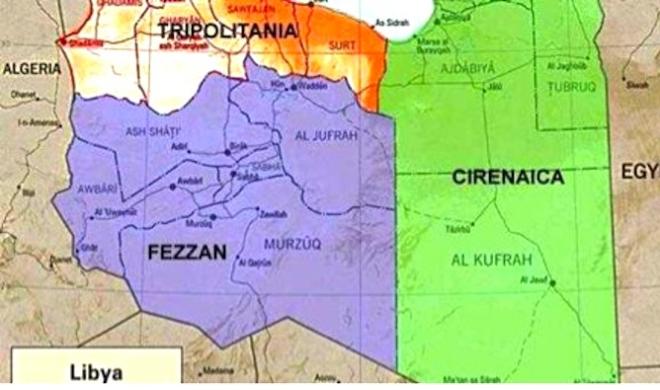The NATO intervention in Libya was an unmitigated disaster.
At the outset, Washington policymakers believed that the people would rise up en masse against Gaddhafi, and embrace the new “democratic” government which was installed in the aftermath of his execution. This didn’t happen.
Instead, NATO was pulled ever deeper into the theater because there were few military or government defections, Gaddhafi didn’t buckle in the face of direct Western intervention, and the people did not rise up against him in substantial numbers; they would not even support the rebels with food, water, or supplies. Despite the no-fly zone, his forces continued to close in on Benghazi, forcing NATO to expand its military involvement, to include arming and training the rebels.
Ultimately, the tide was turned by the participation of AQIM; an al-Qaeda detainee released from Guantanamo Bay became one of the most prolific leaders of the rebellion. The organization offered their support to the rebels early on in the protests—and why shouldn’t they have? The government was moving in on their territory. According to the CTC, Libya provided the highest number of foreign insurgents in Iraq, per capita; most of these hailed from east, a la Benghazi.
But even the influx of al-Qaeda fighters was insufficient to “close the deal.”
And so, as with UNSCR 1441, various NATO allies were forced to overstep UNSCR 1973 in order to wrest Gaddhafi from power—in the process violating international law (although who is going to hold them accountable, with the U.S. on their side?).
After Gaddhafi was brutally murdered, the new government in Tripoli was not overwhelmingly embraced. In fact, the people of Sirte refused altogether to submit to the National Transitional Council, prompting the new government to shell the city “into the Dark Ages” — exactly what Gaddhafi had planned for rebellious Benghazi, further undermining the flimsy “responsibility to protect” justification through which the invasion was carried out.
In fact, Libya’s already-fragile infrastructure was decimated by the NATO campaign and civil war—as was neighboring Tunisia’s already fragile economy, fueling the instability which persists to this very day.
Meanwhile, al-Qaeda and its affiliates were among the primary beneficiaries of U.S. and allied arms, funding, training, and supplies. In addition to the munitions provided by “allied” powers, the militants raided the regime’s arsenal, gaining access to large quantities of extremely potent munitions, to include chemical weapons and delivery systems to deploy them.
Al-Qaeda has subsequently deployed these assets throughout the Maghreb and Sahel—culminating in the attack on the U.S. embassy in Benghazi, resulting in the death of Ambassador Chris Stevens. AQIM further exploited their base in Libya to plan and execute a successful conquest of northern Mali, prompting a French intervention of unspecified length in their former colony. This, in turn, led to an AQIM response attack in Algeria which killed scores of foreign nationals from around the world. Munitions from Libya have also been relied upon by al-Qaeda affiliated groups in Syria, who play an increasingly significant and destabilizing role in the conflict. In fact, using weapons provided to the rebels in Libya, they have even attempted to carry out an attack in Jordan.
But more significant than the material empowerment the Libyan intervention granted to al-Qaeda, it ceded the narrative back to the jihadists. Al-Qaeda had been marginalized from the very revolutions they had fought so hard to bring about—and they would remain sidelined so long as the protests remained civil in nature. However, through the NATO campaign, Western nations ultimately affirmed al-Qaeda’s long-held position that tyrants will not yield to the popular will: they must be forcibly overthrown. Since then, the organization has transitioned from the peripheries of the region into the heart of the Middle East—and its ideology is going increasingly mainstream.
Two years after the intervention in Libya, which killed thousands under the pretense of R2P, corruption is rampant, war crimes continue against minority groups, and militias roam with impunity. The Libyan government never controlled much beyond the capital, but has been coming under direct assault even in Tripoli. The good news? At least they do not have to worry about securing the rest of the country anymore.
As of today, the nation formerly known as Libya has split itself into the emirates of Fezzan, Cyrenaica, and Tripolitania: three failed states for the price of one intervention!
Or maybe only two of three will fail—after all, Cyrenaica, the initial defector, is also home to most of Libya’s oil reserves; formerly, the region generated about 80% of Libya’s total wealth. With so much at stake, amounting to the largest oil reserves in Africa, and the 5th largest on the planet, Tripoli cannot afford to allow this succession—but nor are they in a position to stop it. These tensions may be compounded by the various outside powers vying for Libya’s oil rights, who may patronize the competing factions as part of their bid for these resources. All said, the country seems poised to descend back into civil war.
Astonishingly, none of this seems to be inhibiting Hillary Clinton’s presidential aspirations, despite the pivotal role she played in the Obama Administration’s disastrous approach in Libya and throughout the region, and despite the immense blowback from the Administration’s mishandling of the Benghazi incident. Although one would be hard-pressed to point to any real successes that would compensate for the Administration’s horrible mismanagement of Libya and Syria under her tenure, the media inexplicably continues to portray her as an exemplary Secretary of State.
Who knows, maybe when she wins in 2016, she’ll give whatever is left of Libya a proper invasion, with all the success America brought to Afghanistan and Iraq (which she was also in favor of invading). Of course, she’ll have a full plate: by that time, Syria will likely be partitioned as well, in large part due to Obama Administration policies she played a role in forming or strongly endorsed. So many quagmires, so little time.
